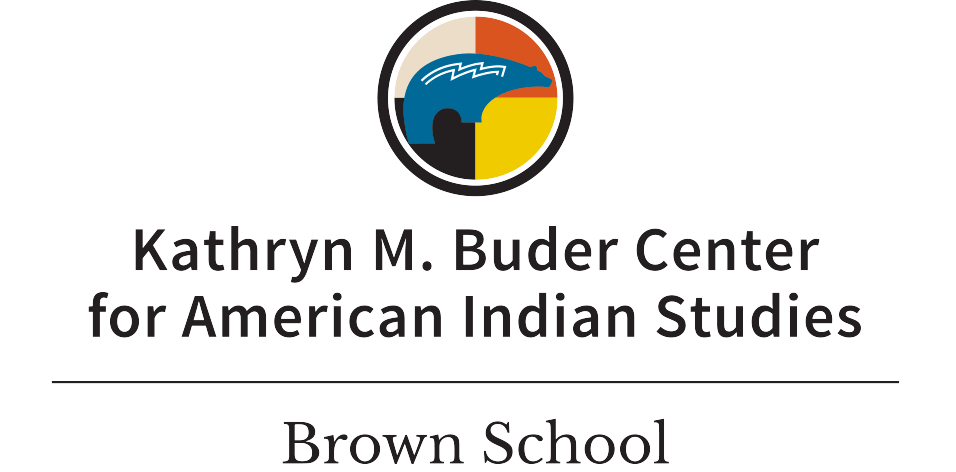The Alliance for Native Programs and Initiatives is comprised of five organizations:
The Kathryn M. Buder Center for American Indian Studies is committed to the education of American Indian/Alaska Native students at the Brown School. We develop future leaders to practice in tribal and urban communities where they will make significant and sustained impact to the health and wellness of Indian Country. The local Native community relationships and the regional partnerships that the Center has are essential in increasing awareness, visibility and understanding of Native issues, cultures, and histories to the St. Louis region. The Buder Center is excited about this new collaboration among the ANPI organizations and is committed to strengthening collaboration among Native community members and regional organizations.
The Missouri Historical Society serves as the confluence of historical perspectives and contemporary issues to inspire and engage audiences in the St. Louis region and beyond. In keeping with this mission, MHS is committed to preserving and sharing the stories and perspectives of Natives peoples from our region's earliest history through today. Whether it's highlighting indigenous artifacts in the Missouri Historical Society's world-renowned collection, working to ensure Native peoples' stories are represented in the narratives of our exhibits, or hosting programs that explore the lives of Native people today, the Missouri Historical Society is dedicated to working with Native communities to ensure their stories are told for generations to come.
In 2016, Missouri Humanities launched a statewide heritage program to emphasize the region’s rich Native American history as well as its contemporary Indigenous culture. In constant collaboration with tribal nations, Indigenous organizations, regional nonprofits, Missouri universities, and state and federal governmental agencies, the program aims to support statewide projects, initiatives, and partnerships that foster appreciation for our Native American heritage through preservation, interpretation, and public programming. Missouri Humanities conducts a statewide heritage program emphasizing the region’s rich Native American history and culture. Through ongoing collaboration with tribal nations, regional nonprofits, Missouri universities, and state and federal governmental agencies, the program supports statewide projects, initiatives, and partnerships that foster appreciation for our Native American heritage through preservation, interpretation, and public programming. ANPI facilitates the success of this overall program by providing guidance in Native American affairs and culture.
The Saint Louis Art Museum collects, presents, interprets, and conserves works of art of the highest quality across time and cultures; educates, inspires discovery, and elevates the human spirit; and preserves a legacy of artistic achievement for the people of Saint Louis and the world. The Museum has collected Native American art since 1920, and currently displays collection highlights in three galleries as well as thematic exhibitions. Programming for Native American art includes the Annual Donald Danforth Jr. Memorial Lecture, gallery talks, and special auditorium programs.
The Saint Louis Zoo WildCare Institute’s mission is dedicated to creating a sustainable future for wildlife and people around the world. Part of this work is through the Center for Native Pollinator Conservation’s Native Foods Native Peoples Native Pollinators Initiative. This initiative focuses on issues of food security of Native Americans and First Nations people, the intersection of wild and cultivated foods, cultural traditions and food sovereignty, healthy lands and people, and nature (as represented by pollinators). This initiative works to develop programs and projects suited to the needs and desires of Native Americans in Indian Country and in urban centers. The Zoo consults and works with elders, tribal officials, agencies, farmers, gardeners, and conservationists to help understand and identify food and environmental needs, work with tribal communities on the ground and build sustainable, reciprocal long-term relationships. The initiative recognizes that Native knowledge, history, values, and culture are assets in building communities, advancing human health, and developing conservation programs that place importance on harmony with nature. The Zoo also partners with several Alaska Native villages to support shared goals and initiatives like educational opportunities and polar bear conservation. For example, our Alaska Native partners are the lead voice in our Polar Bear Point exhibit where they share their lives as related to polar bears, climate change, and food security (subsistence) awareness.
The Native American Studies program at Southern Illinois University Edwardsville (SIUE) was inspired by Lummi elder Pauline Hillaire. As a collaborator of SIUE Philosophy Professor Greg Fields, Pauline came to the SIUE campus to sing, drum, tell stories, and to talk about Native American history and future. Her words inspired SIUE faculty from Anthropology and Philosophy to come together and coordinate their educational efforts on and off campus. This led to the launch of an interdisciplinary minor in Native American Studies in 2010, and many successful public events bringing Native culture bearers from across the United States and Canada to Edwardsville. We were proud to become an ANPI partner organization in 2024.







